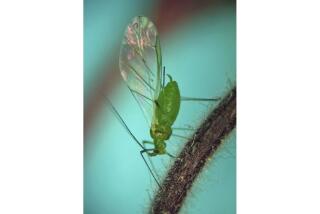Pesky Aphids, Infected by Parasite, Take a Fatal Plunge : Garden of Research Turns Into a Suicide Plot
- Share via
Any backyard gardener who has watched aphids turn a rose garden into a war zone overnight will doubtless applaud the efforts of two Canadian scientists who have stumbled across a way to make the little devils commit suicide.
The scientists were studying evolutionary changes in aphids when they discovered that when infected with a wasp parasite, aphids fling themselves off the plants that serve as their food, plunge to the ground and die, along with the parasite.
Murdoch K. McAllister and Bernard D. Roitberg of Simon Fraser University in British Columbia, who reported their findings in the current issue of the British scientific journal Nature, said they do not intend to market the parasites for use in controlling aphids because the parasites could turn out to be at least as troublesome as the insects. So at this point their research has no practical application.
“This is such a new area we haven’t begun to think what we could do with it,” Roitberg said in a telephone interview.
The scientists are studying how organisms evolve when infected with parasites.
“We wanted to know if the aphids changed their behavior,” Roitberg said.
And the change, as it turned out, was dramatic.
Soon after parasites inject their eggs into the aphids, the aphids “drop off onto the ground much more often than they did before. They don’t survive,” Roitberg said.
Roitberg and McAllister are convinced that the aphids voluntarily leap to the ground and die of starvation.
“The proof of the suicide hypothesis,” as Nature put it in a press release, rests in laboratory experiments in which two groups of aphids behaved quite differently when subjected to the parasite.
Aphids from a warm inland area were especially susceptible to suicide while those collected from a cooler area near Vancouver “tend not to do this,” Roitberg said.
The fact that aphids in different areas behave differently is proof that it is the aphids, and not just the parasites, that bring about the suicide, he said.
Death, even among aphids, can have a humanitarian angle, he suggested. The aphids probably kill themselves to protect their fellow aphids, he said.
At some point, the finding could prove valuable in controlling aphids if it helps scientists learn more about the “alarms” that send the insects scurrying for cover. Aphids have enemies as diverse as ladybugs and wasps, and like many insects, aphids give off an aroma that alerts other aphids to imminent danger.
When that happens, the aphids usually respond “either by running away or by assuming a defensive posture known as backing up,” the scientists reported.





